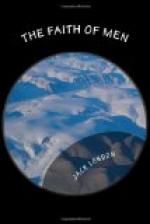“Oh, I say, Corry,” Pentfield called back, “you’d better occupy the old cabin. It’s not been used for some time. I’ve built a new one on the hill.”
TOO MUCH GOLD
This being a story—and a truer one than it may appear—of a mining country, it is quite to be expected that it will be a hard-luck story. But that depends on the point of view. Hard luck is a mild way of terming it so far as Kink Mitchell and Hootchinoo Bill are concerned; and that they have a decided opinion on the subject is a matter of common knowledge in the Yukon country.
It was in the fall of 1896 that the two partners came down to the east bank of the Yukon, and drew a Peterborough canoe from a moss-covered cache. They were not particularly pleasant-looking objects. A summer’s prospecting, filled to repletion with hardship and rather empty of grub, had left their clothes in tatters and themselves worn and cadaverous. A nimbus of mosquitoes buzzed about each man’s head. Their faces were coated with blue clay. Each carried a lump of this damp clay, and, whenever it dried and fell from their faces, more was daubed on in its place. There was a querulous plaint in their voices, an irritability of movement and gesture, that told of broken sleep and a losing struggle with the little winged pests.
“Them skeeters’ll be the death of me yet,” Kink Mitchell whimpered, as the canoe felt the current on her nose, and leaped out from the bank.
“Cheer up, cheer up. We’re about done,” Hootchinoo Bill answered, with an attempted heartiness in his funereal tones that was ghastly. “We’ll be in Forty Mile in forty minutes, and then—cursed little devil!”
One hand left his paddle and landed on the back of his neck with a sharp slap. He put a fresh daub of clay on the injured part, swearing sulphurously the while. Kink Mitchell was not in the least amused. He merely improved the opportunity by putting a thicker coating of clay on his own neck.
They crossed the Yukon to its west bank, shot down-stream with easy stroke, and at the end of forty minutes swung in close to the left around the tail of an island. Forty Mile spread itself suddenly before them. Both men straightened their backs and gazed at the sight. They gazed long and carefully, drifting with the current, in their faces an expression of mingled surprise and consternation slowly gathering. Not a thread of smoke was rising from the hundreds of log-cabins. There was no sound of axes biting sharply into wood, of hammering and sawing. Neither dogs nor men loitered before the big store. No steamboats lay at the bank, no canoes, nor scows, nor poling-boats. The river was as bare of craft as the town was of life.
“Kind of looks like Gabriel’s tooted his little horn, and you an’ me has turned up missing,” remarked Hootchinoo Bill.
His remark was casual, as though there was nothing unusual about the occurrence. Kink Mitchell’s reply was just as casual as though he, too, were unaware of any strange perturbation of spirit.




